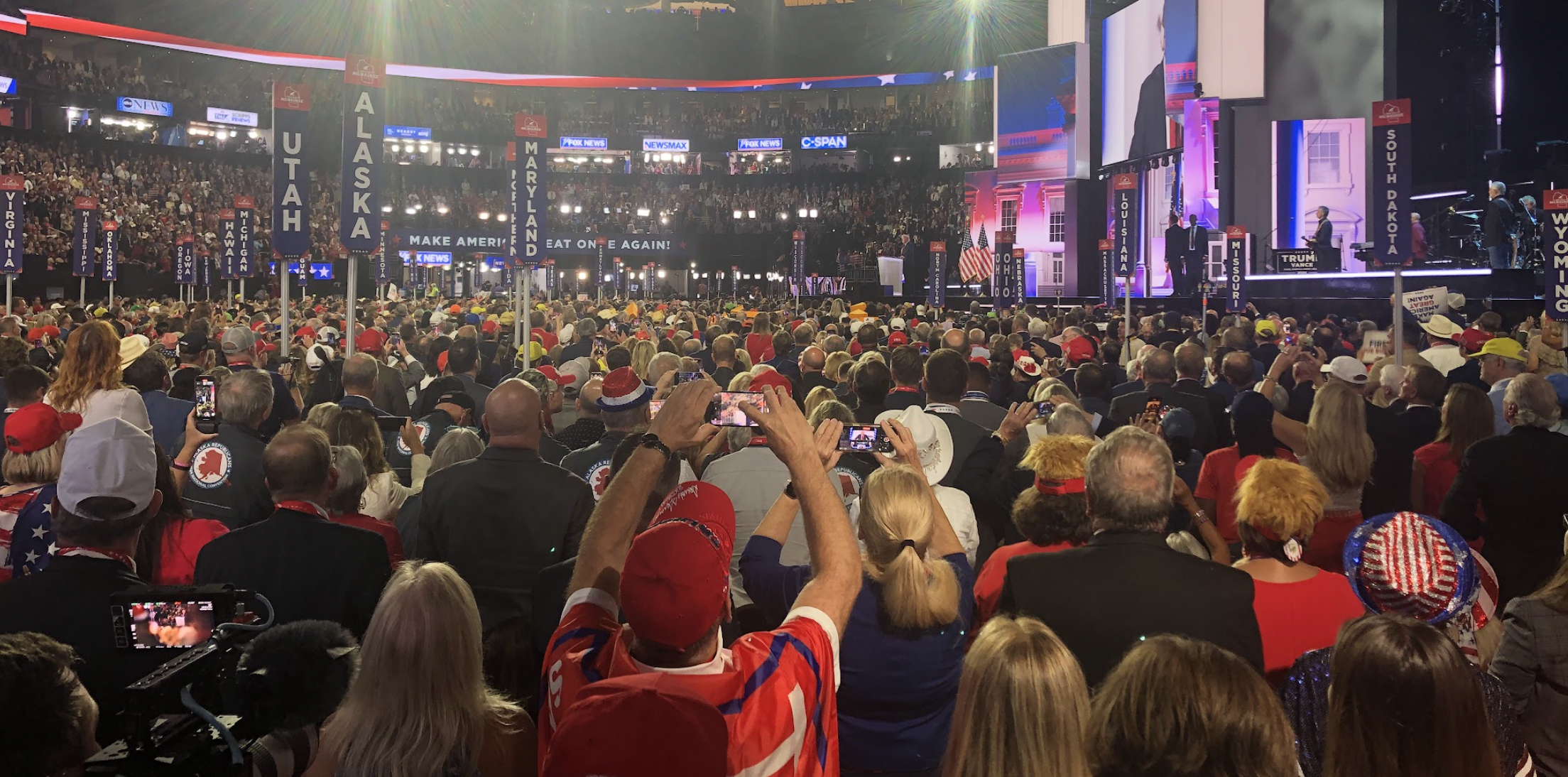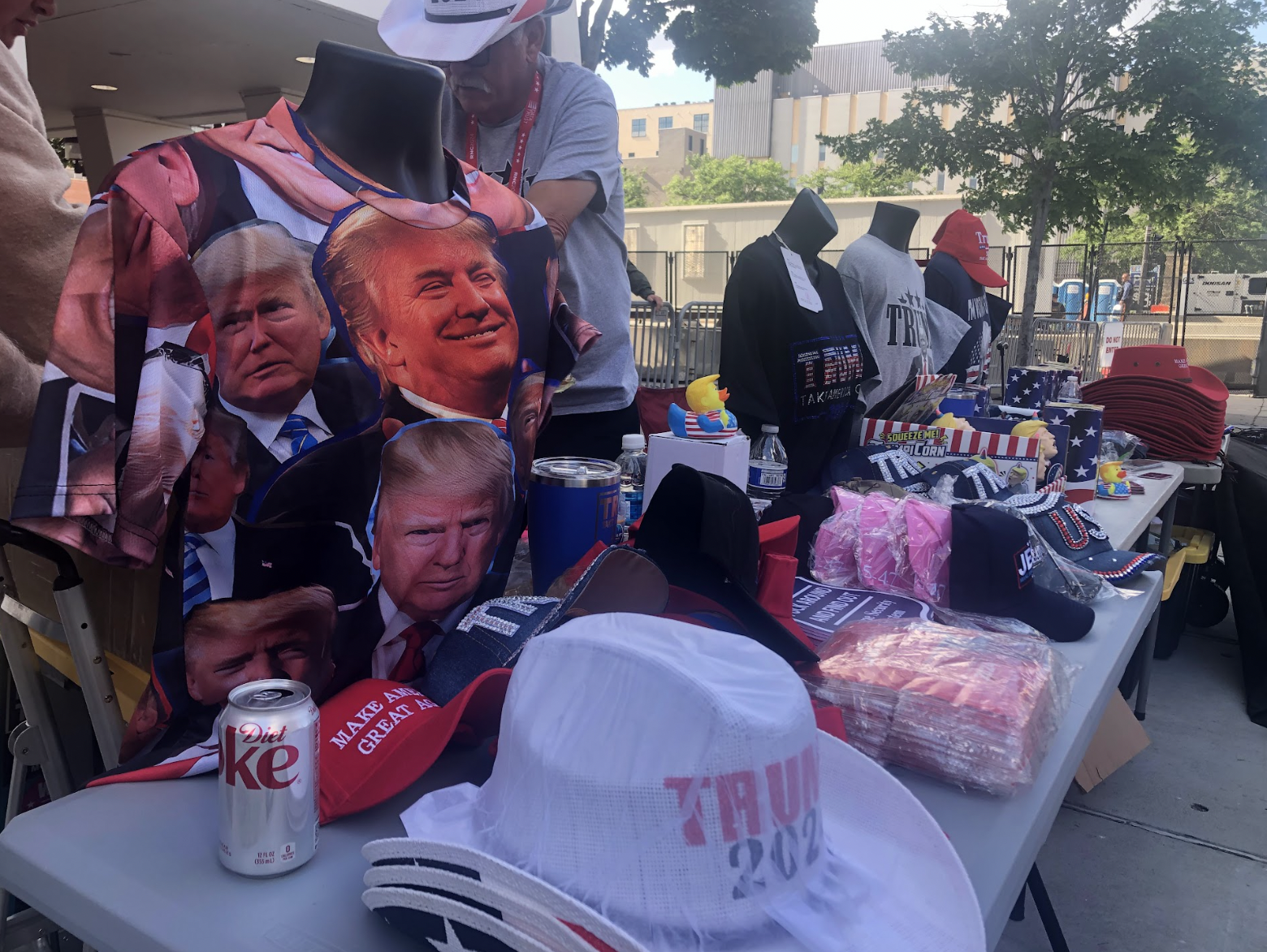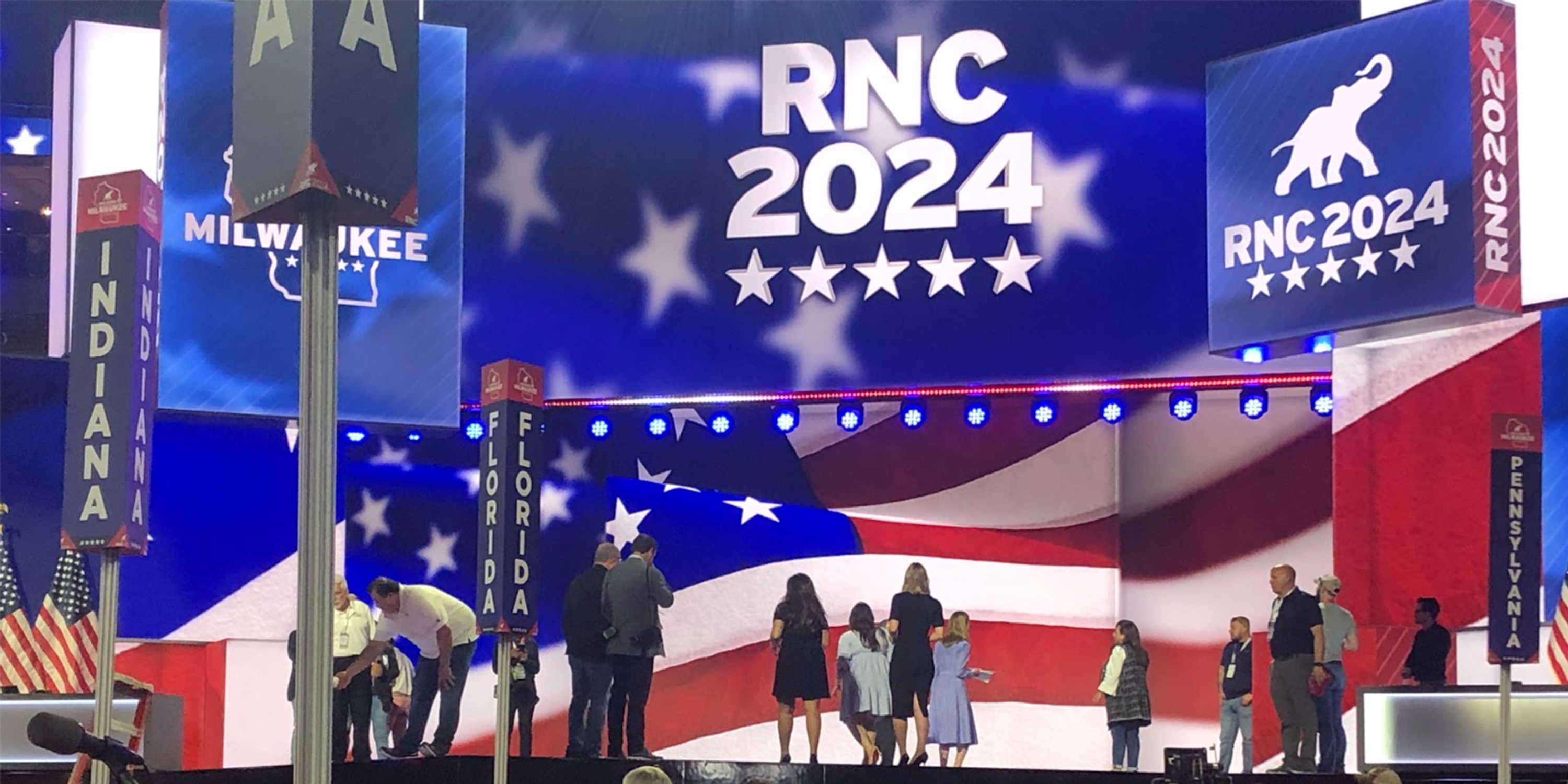The RNC as a Window into American Politics in 2024
This year’s Republican National Convention was a historic one, sandwiched between an attempt on former President Donald Trump’s life and President Joe Biden’s withdrawal from the electoral race. The convention brought delegates from across the country together to discuss the future of the Republican Party and the upcoming presidential election.
On July 18, the fourth and final day of the RNC, JD Vance was announced as Trump’s official running mate, and select delegates shared their views on key Republican initiatives, and the state of American politics and democracy in 2024 as reflected in campaigning. North Carolina delegate Brooke McGowan and Tennessee delegate Kevin Powers had strong, choice words on the subject, along with some views from Tim Hoelter, an alternative delegate and former chair of the U.S. Department of Commerce’s Industry Trade Advisory Committee for Consumer Goods.
Each day of the convention focused on specific topics of concern widely shared by the party. Monday’s focus was on economic improvement, Tuesday’s was on targeting crime, Wednesday’s was on national security and foreign policy, and Thursday focused on Trump’s overall strategy to “strengthen” the country.
Monday
Though Trump did not formally speak Monday, July 15, he made his first public appearance after the attempt on his life at a rally near Butler, Pennsylvania on July 13. Several convention attendees sported bandages on their ears as a symbol of support and solidarity with their presidential nominee.
Each state’s delegates cast their votes for Trump, eliciting mostly positive responses from the convention attendees, with the exception of Mitch McConnell. His announcement, “The commonwealth of Kentucky proudly casts 46 votes for the next president, Donald J. Trump,” was met with a chorus of boos and a few discernable cheers.
His chilly reception was likely because the GOP remains critical of McConnell’s acknowledgement of Biden winning the 2020 election and his criticisms of Trump inciting the January 6 insurrection. McConnell previously called Trump “practically and morally responsible for provoking the events of the day.”
Ohio Senator James David (JD) Vance was also swiftly named as Trump’s chosen nominee for vice president on Monday. The nomination of the controversial politician and Marine veteran came to some as a surprise, considering Vance had been highly critical of Trump in the past.
Vance once called the former president a “moral disaster” in Twitter direct messages from summer 2017. A former self-proclaimed “Never-Trumper,” Vance once publicly called Trump “reprehensible” and an “idiot.”
Vance told CNN’s Jake Tapper prior to the 2016 election, “I’m definitely not gonna vote for Trump because I think that he’s projecting very complex problems onto simple villains.” Now, in a statement to CNN in June, Vance claims to be one of Trump’s “strongest supporters” in the Senate today. He claimed to have shifted his stance on Trump after his “many successes in office” during his presidential term.
When questioned how Vance would serve as running mate considering his past criticisms of Trump, Tennessee Delegate Kevin Powers said Vance was young but has since matured after having a family and changed his tune.
“The bottom line is that we all make mistakes,” Powers said.
Powers continued: “He is the best choice that Trump could have made. He really is just a younger version of President Trump and the best one to carry on the MAGA movement that President Trump has brought forth.”
North Carolina Delegate Brooke McGowan mirrored Powers’ response, claiming that Vance is neither the first nor the last to change their mind about Trump.
“We have all decided the country is worth unifying over, and it’s not about personality. It’s not about a man. It’s about a mission, and it’s about protecting our country,” McGowan said.
Beyond naming Vance as Trump’s running mate, the speeches of the day were particularly critical of Biden’s handling of the economy during these times of skyrocketing inflation. Few speakers proposed plans to solve the inflation beyond reinstating Trump as president. The cause of rising gasoline and grocery costs was attributed to the $1.9 trillion in pandemic aid provided during Biden’s term.
The overwhelming fiscal confidence that conservatives have in Trump is reflected in several delegates.
Wisconsin native and alternate delegate Time Hoelter’s economic desires for Trump’s potential term as president are simple: “I would hope that we could just have good economic policy, we could have good taxes that would provide growth, and that we’d have prosperity.”
Hoelter identifies as independent, being “fiscally conservative” but “socially liberal.”
McGowan hopes lower mortgage rates, gas and food prices would result from Trump’s potential reelection.
“We need to bring back prosperity to Americans. I’m living in a 600-square-foot barn right now because I can’t afford it. Construction costs have gone through the roof,” McGowan said.
McGowan was particularly dismayed at the general cost of living: “You can’t even afford to live anymore, so I’m looking forward to being able to survive.”
Tuesday

People gather outside the Fiserv Forum on the second day of the RNC, Tuesday July 16, 2024. Photo by Morgan Kirsch.
On Tuesday, July 16, Florida Gov. Ron DeSantis and former South Carolina Gov. Nikki Haley both endorsed Trump as the presidential candidate for the Republican Party.
With “securing the border” and pivots in foreign policy as the primary topics of discussion during the second day of the convention, some delegates were in clear agreement on the subject. Both McGowan and Powers cited “closing the border” as one of the main changes they expect if Trump were to be reelected.
McGowan called the “tsunami” of undocumented migrants entering the US the nation’s “number one problem.”
“We are not a country if we don’t have a border. We’re no longer sovereign. We’re just opening ourselves to all kinds of problems from across the world, and we don’t need that,” she said.
Conversely, Hoelter is more concerned about the Republican Party’s propositions for trade and foreign policy, with the exception of reduced relations with China.
One proposed trade policy proposed by the Republican Party is a baseline tariff on all foreign-made goods. Trump has previously suggested a 10 percent rate for such tariffs.
Hoelter specifically does not want to see tariffs imposed on imported goods because “the cost of that would be passed on to the American public.”
Texas Sen. Ted Cruz and entrepreneur Vivek Ramaswamy, who dropped out of the presidential race after an unsuccessful Iowa caucus, also spoke during the convention. Both placed emphasis in their speeches on the dangers they claim immigration and undocumented migrants pose.
The second night of the convention closed with personal anecdotes on Trump’s life and relationships with his family from Lara Trump, the co-chair of the Republican National Committee and the former president’s daughter-in-law.
Wednesday

RNC delegates and other attendees cheer Wednesday, July 18, 2024. Photo by Morgan Kirsch.
The third night of the convention was marked by Vance officially accepting his nomination as running mate. Vance detailed his life story while reasserting his respect for Trump following the assassination attempt.
“When Donald Trump rose to his feet in that Pennsylvania field, all of America stood with him,” Vance said, painting the former president in an almost martyr-like image.
“They said he was a tyrant, they said he must be stopped at all costs, but how did he respond? He called for national unity, national calm, literally right after an assassin nearly took his life,” he said.
A group of GOP senators even chased Secret Service Director Kimberly Cheatle through the Fiserv Forum, demanding answers from her about the attempt on the former president’s life.
Various other groups and speakers addressed on Wednesday criticized the withdrawal from Afghanistan, handling of Hamas kidnapping victims and claimed rising antisemitism during the Biden administration.
Remarks were also made by Usha Vance, JD Vance’s wife, in support of his nomination.
17-year-old Kai Trump also spoke of her support for her grandfather, lamenting the assassination attempt and claiming the media frequently misrepresents Trump.
Peter Navarro, Trump’s former deputy assistant during his administration, received an extremely enthusiastic welcome from the GOP attendees after being released from prison in Florida only hours before. He spent the past four months in that jail for refusing to cooperate with the House investigation into the January 6, 2021, insurrection.
In Navarro’s speech to the convention, his incarceration was framed as an injustice. He claimed the United States House Select Committee leading the investigation demanded he “betray” Trump.
“I went to prison so you won’t have to. I am your wakeup call,” Navarro said.
Thursday

Terry Gene Bollea, or “Hulk Hogan” praises Donald Trump in his speech Thursday, July 18, 2024. Photo by Morgan Kirsch.
The fourth and final day of the RNC included a performance by Kid Rock and a dramatic speech from Terry Gene Bollea, or “Hulk Hogan,” a famous retired American professional wrestler. As he ripped his shirt off, Hulk Hogan enthusiastically revealed a bright red Trump-Vance tank top.

Donald Trump speaks about his assassination attempt Thursday, July 19, 2024. Photo by Morgan Kirsch.
Trump’s highly anticipated formal acceptance of his nomination and approximately 92-minute speech closed the night. According to NBC News and ABC News, it is the longest acceptance speech in convention history.
Trump began his speech with his recollection of the assassination attempt, praising the rally attendees for not running amidst the chaos of the shooting. The speech descended into long-winded tangents on various topics, including but not limited to the economy under both Trump and Biden administrations, events in the Middle East and immigration.
If Trump is reelected, Powers hopes to see border closures and the reversal of “every decision that has been made for the past four years.”
Hoelter simply hopes that if Trump were to become president, that he’d do a good job: “I would want him to become successful if he becomes president, just like I’d want any president to be successful.”
Biden’s Withdrawal from the Presidential Race
Just three days after the RNC, Biden officially dropped out of the 2024 presidential race and endorsed Vice President Kamala Harris as the next presidential candidate. To many, the withdrawal was expected after a poor performance in a June debate that inspired more criticism regarding the President’s age and cognition. He also announced a Covid-19 diagnosis July 17 during the third day of the RNC.
McGowan said she didn’t expect Biden would move forward in the 2024 election three days prior to Biden’s public withdrawal.
When questioned what she would expect from another potential Biden administration on the final day of the RNC, McGowan said, “My expectation if he wins is that he doesn’t even serve a day. Honestly, I don’t think they’re going to let him run.”
In Biden’s address to the nation on July 24, he said “I revere this office, but I love my country more.”
Biden went on to say that now is the time for “fresh, young voices” and is ready to “pass the torch to a new generation.”
His speech detailed his administration’s achievements over the years in areas such as the economy, health and safety, social and civil rights, foreign policy and judicial action.
He celebrated what he claimed to be the creation of nearly 16 million new jobs, leading to a strong economy over the years. He said the racial wealth gap is also now the lowest it’s been in 20 years.
Biden discussed lowering prescription drug costs for seniors, expanding healthcare access, and signing significant climate and gun safety laws. He also discusses his successes in “securing the border,” claiming, “Border crossings are lower today than when the previous administration left office.”
Biden continued to detail actions such as appointing the first Black woman to the Supreme Court and pushing for Supreme Court reform.
In the last six months of his term, Biden said he’s resolved to protect voting rights and personal freedoms, rally nations against Putin’s aggression in Ukraine and make efforts to end the war in Gaza and secure peace in the Middle East.
In the last general election Hoelter actually voted for Biden out of the hope that he would “center” American politics and facilitate conversation and progress between parties. Instead, he says Biden went “way left.”
“I’m super disappointed and sad that I voted for him. It was a mistake,” Hoelter said.
Biden ended his speech with a national call to action: “We’re the United States of America and there’s simply nothing, nothing beyond our capacity when we do it together. So let’s act together, preserve our democracy,” he said.
Democracy?
When questioned on the final day of the RNC how they would define democracy, Powers, McGowan and Hoelter each quickly corrected that the United States isn’t a democracy, but rather a republic.
Powers said, “My problem with the use of that term is that we are not a democracy. We use the democratic process of every American voting for representatives to then go and take care of the country’s business. We are a constitutional republic.”
Powers believes government figures have not upheld this democratic ideal well. “My problem is that so many of our elected officials on every level, from local to national, forget that they represent us,” he said.
Delegates had different explanations for what democracy truly means.
To Hoelter, democracy is “where everyone has an opportunity to make their feelings known, and for those who we elect as leaders, that they will then listen to the public.”
Conversely, McGowan calls democracy “mob rule” or means “whatever leftist is in charge.”
Some delegates agree that despite being a constitutional republic, we use democratic processes.
When asked if the US is faring well at being truly democratic, Hoelter said, “No, I think we could be much better.”
“I think both in terms of the media and in terms of our ability to listen to others. To listen to our neighbors even though we may have different views. Listening is a lost art,” he continued.
By listening to each other, Hoelter hopes the polarization of today’s politics becomes less intense.
Idolization in American Politics

A table of Donald Trump-themed merchandise outside a perimeter entrance into RNC grounds. Photo by Morgan Kirsch.
Sometimes politicians are treated like celebrities, and within every campaign there are clear performative elements. People who sport merchandise with candidates’ faces plastered over every T-shirt and baseball cap can often be witnessed everywhere within eye’s reach.
People project their hopes and fears onto the figures they think will make a difference, making it easy to perceive others in terms of black or white, good and evil. It becomes easier and easier to idolize members of both political parties as paragons of virtue or villainy. Especially during political campaigns, the images of politicians are carefully crafted and polished to a shine. Can that shine be blinding, even dangerous?
To Hoelter, there is more of a danger posed by “cults” than idolization. He placed an emphasis on the importance of independent thinking and making one’s own judgments.
“No one is perfect. No one is a demigod, so I think if we’re idolizing someone, we can look up to them, but to think that they’re perfect and make no mistakes is wrong. And that can be dangerous,” he said.
He continued that idolization is everywhere. “Certainly here at this rally, of course there is. Which is natural. It will happen and be the same way in Chicago. When you go back to the United Center, there will be idolization of whomever becomes the candidate for the Democratic Party. The jury’s out right now,” Hoelter said.
Within the chaos of this electoral year, people’s eyes are on the RNC for how the Democratic Party will pivot with Harris now leading the charge.
Header by Morgan Kirsch




NO COMMENT